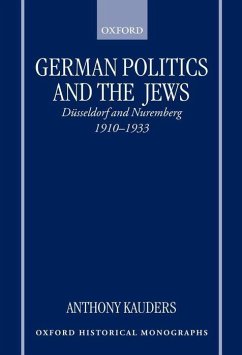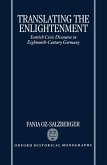This is a scholarly reassessment of the 'Jewish Question' in Germany (1910-1933). Anthony Kauders challenges the view that, following Hitler's rise to power, anti-Semitism radically increased among the majority of Germans. He argues that the Weimar Republic was also very influential in changing people's attitudes towards the Jews and their place in German society. Through a study of Dusseldorf and Nuremberg, two German towns of comparable size but disparate regional, religious, and economic characteristics, he explores the attitudes of journalists, politicians, clerics, and ordinary people. Using local and national archival material, Dr Kauders is able to show that, whereas before the First World War most Germans would distance themselves from racial anti-Semitism, after 1918 many Germans agreed with volkisch agitators that Jews were, in a variety of ways, alien to the national community.








